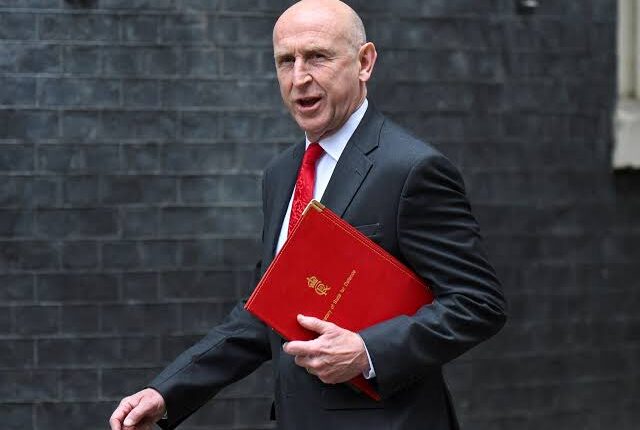UK Secretly Relocated Thousands of Afghans After Major Data Leak
The United Kingdom secretly resettled thousands of Afghans after a 2022 data leak by the Ministry of Defence exposed personal details of those who had worked with British forces, putting them at risk of Taliban reprisals, newly unsealed court documents have revealed.
The sensitive information, which included the names and details of nearly 19,000 Afghan applicants and their families, was mistakenly shared online — later surfacing on Facebook in 2023. Fearing retaliation from the Taliban, the then-Conservative government initiated a covert relocation program to bring affected individuals to Britain, at an estimated cost of £2 billion ($4.1 billion).
A super-injunction had previously barred the media from reporting on the breach and the government’s response, but the gag order was lifted Tuesday, following a review launched by Prime Minister Keir Starmer’s centre-left government.
Defence Secretary John Healey, addressing the House of Commons, issued a public apology: “This serious data incident should never have happened. While it occurred under the previous government, I offer a sincere apology to all whose data was compromised.”
The breach is considered one of the most damaging in modern UK defense history, not only due to its cost — potentially reaching £7 billion — but also because of the grave risk it posed to Afghan allies left vulnerable after British forces withdrew in 2021.
According to Healey, approximately 4,500 Afghans and their family members — totaling around 24,000 people — have been relocated or are in the process of being resettled under the program. A Ministry of Defence-commissioned review indicated that over 16,000 of those affected had arrived in the UK as of May 2025, some through previously existing schemes.
Despite the scale of the effort, Healey said no further asylum offers would be made solely based on the data leak, citing a review that found limited evidence of Taliban-led retribution campaigns targeting those named.
The super-injunction was first issued in 2023 after officials warned that revealing the breach could endanger lives by prompting Taliban crackdowns. The High Court later confirmed the leaked dataset contained personal information on more than 33,000 applicants.
Legal action against the UK government is now underway, as some victims of the leak seek compensation.
The scandal comes at a politically sensitive time, with Britain’s strained public finances under scrutiny and anti-immigration sentiments rising. The right-wing Reform UK party currently leads in national polls, posing pressure on the Starmer-led administration to balance humanitarian commitments with domestic concerns.
British troops were first deployed to Afghanistan in 2001 following the 9/11 attacks, remaining in combat roles until 2014. Thousands of Afghans worked with UK forces during the two-decade-long conflict, many of whom were promised protection after the withdrawal.
The fallout from the data breach is ongoing, with questions mounting over how such a catastrophic security lapse occurred — and whether enough is being done to protect those left behind.


